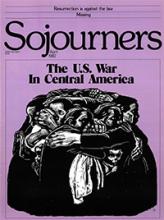A recent Washington Post editorial tells the story of Domingo, a 13-year-old Salvadoran who lives with his mother in a refugee camp just outside San Salvador. Until two years ago, Domingo and his family were part of a Christian base community. Then their village was attacked by ORDEN, the supposedly outlawed right-wing Salvadoran paramilitary organization. His father and three brothers were murdered. Domingo bears gruesome scars from the attack: huge, crudely stitched welts across his face, neck, and arms made by a machete that nearly dismembered him. Asked whether he is angry at what happened to him when he was just 11 years old, Domingo pauses for a while and then says, barely audibly, "Yes." Philippe Bourgois, a U.S. graduate student recently returned from El Salvador, recounts his escape with a thousand peasants from a Salvadoran government attack. For days they zigzagged across fields, hiding day and night behind boulders and trees to escape helicopter strafing that came 10 to 12 times a day.
He saw a young boy blown in half by a grenade. And he helped hold the legs of another while shrapnel was removed from his body, stuffing a rag in the boy's mouth so his screams would not alert the government troops.
Workers with Salvadoran refugees in Honduras speak of a condition common among the children, which they have named "persecution delirium." Its symptoms are a constant feeling of fear, accompanied by long periods of crying and inability to relax or concentrate.
In El Salvador an entire generation--those who survive--are growing up haunted by the ghost of terror. Even those who have escaped personal physical torment have witnessed the rape of their mothers, torture of their fathers, murder of their sisters and brothers at the end of a bayonet or from a helicopter's indiscriminate fire.
Read the Full Article

